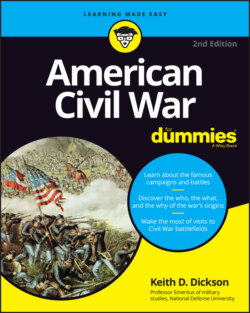Читать книгу American Civil War For Dummies - Keith D. Dickson - Страница 80
The decisions that led to war
ОглавлениеOver the next month, Lincoln and his advisors wrangled over what to do. General Winfield Scott, the senior military officer, saw no chance to gather enough men, ships, and ammunition to relieve the fort before Anderson’s food ran out. He therefore recommended that the fort be given up.
Close to despair, Lincoln granted a request from his postmaster general for a special meeting. Montgomery Blair proposed a plan to Lincoln: Resupply the fort secretly, with Blair’s brother-in-law as the leader of the expedition. The plan called for several support ships to arrive secretly outside Charleston harbor. Tugs working under cover of darkness would ferry the men and supplies to the fort. Lincoln liked the idea and gave instructions to the War Department to carry out the plan.
Almost immediately, nothing went right, and Lincoln began to have second thoughts about the secret resupply mission. Lincoln then notified the governor of South Carolina that he intended to resupply the fort. He had two conditions: If the relief ships were not fired on, they would only offload food. If fired upon, the ships would offload food, ammunition, and troops. At the same time, Lincoln sent a message to Anderson informing him of the resupply plan and instructing him to hold out as long as possible. In the same message, the president gave Anderson the authority to surrender the fort if the situation made it necessary. Anderson must have found those instructions confusing. On one hand, he was to hold out as long as possible; on the other hand, he could surrender the fort. Essentially, Lincoln had placed the decision for peace or war in the hands of an army major.
Now it was Davis’s turn to sweat. Davis could not allow the federal government to resupply Sumter without a fight. The Confederacy had to demonstrate to the world that its independence was legitimate. He ordered the commander of the Confederate forces in Charleston, General P.G.T. Beauregard, to resist any efforts to resupply Sumter. A few days later, responding to popular pressure to do something about Sumter, Davis instructed Beauregard to demand the fort’s immediate surrender and to fire on the fort if the demand was refused. On April 11, three Confederate officers, one a former senator with the new rank of colonel, made a visit to Fort Sumter. With proper military courtesy, the group presented Major Anderson with the formal surrender demand. Anderson refused to surrender but made it clear that by April 15 there would be no more food, and he would give up the fort. Yet they both knew that some of the ships of the relief expedition had arrived that night but without the tugs necessary to transfer supplies. The Confederate officers returned to Sumter at 12:45 a.m. for Anderson’s final answer. Again he refused to surrender until his food ran out. Given this reply, the Confederate officers responded that the fort would be fired on in one hour.
